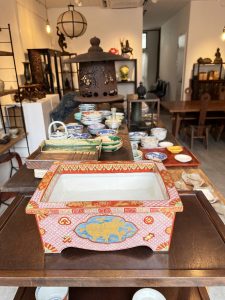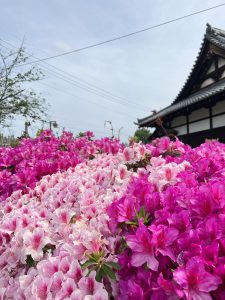連休、いかがお過ごしでしょうか。(愛知県名古屋市千種区姫池通 骨董品買取 古美術風光舎)
2024.04.29
みなさまこんにちは、スタッフYでございます。

連休ど真ん中、皆様いかがおすごしてでしょうか。この過ごしやすい時期を楽しんでいらっしゃいますでしょうか。私はこうやって本日は仕事をしておりますが、連休中お仕事の方も多いのではないでしょうか。
お子さんのいらっしゃる方は別として、大人だけの事情でしたら、このところお休みの時期をずらしてとる方もいたりして、このところ、そんなに「ここで休まねば!」といった時代ではなくなったような気がいたしますが、お休みはどこかでほしいものですね。
ところで、昔の人はハレの日以外そんなに休みがなかったような話を聞きますが、それは農作物を作っていた農民に限ってだったのでしょうか。武士のようにお勤めのある方の働き方はどうだったのか、調べて見ると江戸時代の武士の働き方がちょっと興味深かったので少しお付き合いくださいませ。
例えば江戸城に勤務する武士。護衛や雑務に従事する下級武士は「3日勤め」。2日勤務したら、次の日は休みだったようです(当番2日、非番1日)。朝から晩までの勤務というわけではなく、朝番・夕番・不寝番に分かれた三交代制だったのだようでして、また、藩の事例ではあるが、長州藩の城の警備職の場合は1日夜勤して2日休みというものもあったようです。
ただし、下級武士の給料は低かったので、それではとても生活していけないということで、カゴやザル作り傘張りなどの内職をしていたようです。つまり休みの日にも多くの時間は仕事をしていたということになり、ある意味現在の副業OKの会社のようですね笑。
また、中級以上の武士になるとさすがに内職などをする必要はなかったようですが。ちなみに上級の武士はどういう働き方だったのでしょうか。
江戸幕府の最高職というべき老中は、譜代大名の中から選ばれ定員は4人から5人。月番制であり毎月1人が担当したようです。午前10時に江戸城に登城し、午後2時には退出したというから勤務時間は約4時間でありました。とは言え、老中職の仕事だけでなく藩主としての仕事もあるので、かなり多忙だったようです。役職を掛け持ちる会社役員のようですね。
また、寺社奉行は定員約4人、町奉行は2~3人というように、江戸幕府は各役職の定員が複数人であったようで、老中と同じように月番制でありました。1カ月交代で業務をしつつ、最後には合議制で物事を決めていったようです。
このような体制にしたのは、1人の者に権力が集中するのを避けるためでしょうが、1人で物事を決めるのではなく他人と合議することによって、よりよい解決策を見出すことができると考えたという見方もできるのでしょうか。いやいや、意地悪く考えるなら責任の所在を明らかにしない無責任体制ともいえるかもしれませんね。
ただし武士の勤務時間(日数)や時間管理は商家や農家に比べて、楽なように見えるものの無断欠勤には処罰もあったし、時間厳守の風潮もあったようでう。また、勤務を終え自宅に帰ってからも、自宅で執務することもあったり、下級武士のように内職のような残業のようなものであったりと、結構厳しめで忙しかったようですね。
こうやって昔からよく働き、それが染み付き「休み下手」の国民性が出来上がったことはよくわかりました…。
ですが、このところの働き方改革でお休みがとりやすくなってきたものの、自分を含めお休み中も心の片隅に仕事や家庭のことが離れない性分の方もいらっしゃるのではないでしょうか。これが手離せたらどんな解放感なのか…、日本人が古から染み付いたマインドセットから解放され、その域に達するのにはもう少し時間を要するような気がいたしますが、そんな私も明日からの連休の予定を今慌てて考えたりと、やはり休み下手が染み付いております。
それではごきげんよう。

Hello everyone, this is Staff Y.
How is everyone doing in the middle of the consecutive holidays? I hope you are enjoying this pleasant time of year. I am working today, but I am sure that many of you are working during the holidays.
Except for those with children, there are some adults who are taking their holidays at different times. It seems that the feeling of “I have to take a holiday here! I feel that the feeling of “I have to take a holiday here!
By the way, I have heard that people in the past did not have vacations except for special occasions. I was interested to learn more about the working styles of samurai in the Edo period (1603-1868), so please bear with me for a moment.
For example, a samurai working at Edo Castle. Low-ranking samurai engaged in guarding and miscellaneous duties had a “three-day shift,” meaning that they worked two days and had the next day off (two days on duty and one day off duty). In the case of castle guards in the Choshu domain, there were also cases where one day was night shift and two days off.
However, since the salaries of lower-ranked samurai were low, they could not make a very good living with that, so they worked inside jobs such as making baskets and colanders and stretching umbrellas. In other words, they spent much of their time working even on their days off. In a sense, it is like today’s companies that allow side jobs.
In a sense, it is like today’s companies that allow people to work on the side. By the way, what kind of work style did senior samurai have?
The highest position in the Edo Shogunate, the Ranchu, was selected from among the feudal lords of the Edo period, and the number of Ranchu was limited to four to five. The post was assigned to one person each month on a monthly basis. The Ranchu arrived at Edo Castle at 10:00 a.m. and left at 2:00 p.m., which means that he was on duty for about four hours. Nevertheless, he was quite busy, not only with the work of the old man’s post but also with his duties as a feudal lord. It seems that he was like a company executive who holds several positions.
The Edo shogunate had a system in which the magistrate for temples and shrines had a maximum of about 4 people, and the magistrate for towns had 2 to 3 people, and like the Ranchu, each position had a monthly shift.
This system may have been adopted to avoid the concentration of power in the hands of one person, but it may also mean that he thought he could find a better solution by discussing with others instead of making decisions alone. No. Or, to put it another way, it could be called an irresponsible system that did not clarify where responsibility lay.
However, although the working hours (number of days) and time management of samurai seemed easier than that of merchants and farmers, there were punishments for unauthorized absences, and there seems to have been a climate of punctuality. In addition, even after returning home after work, they sometimes held office work at home or did some kind of overtime work like low-ranking samurai did at home.
I could understand that working hard in this way for a long time has been ingrained in the Japanese people and has created a national character that is “bad at taking time off”….
However, although the recent reforms in the way we work have made it easier to take vacations, there are probably some people, including myself, who cannot seem to let go of thoughts of work and family in the corner of their minds even during their vacations. I think it will take a little more time for Japanese people to free themselves from the mindset that has been ingrained in them since ancient times and reach that level of freedom. I’m still not very good at taking holidays.
Have a good day.
*******************
ご実家の整理やお片付けなどをされている方のご相談などが多くございます。
お片付けなどくれぐれもご無理のないようになさってくださいませ。
風光舎では古美術品や骨董品の他にも絵画や宝石、趣味のお品など様々なジャンルのものを買受しております。
お片付けをされていて、こういうものでもいいのかしらと迷われているものでも、どうぞお気軽にご相談下さいませ。
また風光舎は、出張買取も強化しております。ご近所はもちろん、愛知県内、岐阜県、三重県その他の県へも出張いたします。
まずは、お電話お待ちしております。
愛知県名古屋市千種区姫池通
骨董 買取【古美術 風光舎 名古屋店】
TEL052(734)8444
10:00-18:00 OPEN

